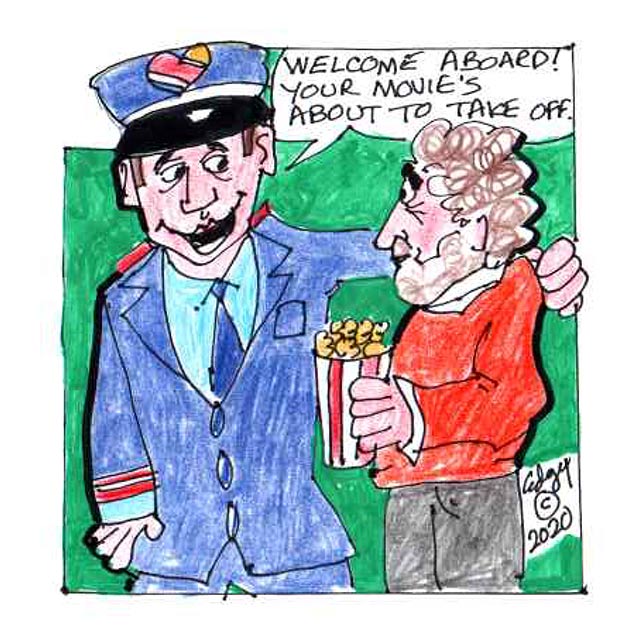AMC Is Closing All Its Moviehouses. Gee, Why?
Attendance and attendees have dropped precipitously
By Ed Goldman
I thought I’d be sadder when I read last month that AMC Entertainment was in such a cash crunch it may be out of dough by early next year, if not sooner. This is the biggest movie theater company on the planet—but even after reopening more than 80 percent of its cinemas, it experienced a staggering 85 percent drop in attendance since the previous year.
And while it’s one more business failure to lay at the hammer-toed feet of Covid-19—filmgoers just don’t feel comfortable in a crowded space whose principal amenity is popcorn dressed with melted butterfat—I have a slightly different take on why people are still staying at home in droves.
Films on the Fly?
First, what moviehouses did right:
To compete with home theatres, which we used to call our dens until TVs got large enough to take up entire walls (thereby saving many of us at least 25 percent on interior decorating), cinemas launched campaigns to turn themselves into destinations. This is a must if you’re going to thrive in our so-called Experience Economy in which it’s not enough to watch a film featuring velociraptors; you must also have the sense one is sitting beside you and will shortly ask if you’re going to finish those Skittles®.
At the same time, theaters wanted you to feel that you were at home—but a home that was never this lux. This was achieved in different ways:
- The audio track in theaters became so deafening you began to feel that nothing else existed but the images being projected on the screen and, in the case of the sound, all around you;
- The seats in new or newly renovated theaters got cushier than even the cushiest La-Z-Boy recliner you could buy, along with cup holders (sized to the average circumference of a barrel to accommodate the popcorn tubs and soft drink silos) and on some, even pop-up food trays;
- A few venues even became dinner theaters, in which you could order a pretty decent meal and wine which would be delivered to you as you were still watching the 38 minutes of coming attractions. When’s the last time your domestic partner did this for you? (If your honest reply is “Last night and every night,” please forward your home address and seating times to this column. We occasionally go into the field on behalf of research.)
- Remember that going to the movies is often a spontaneous decision—like deciding, after neglecting it for eight months, to finally water your lawn at 11:15 p.m., right after watching brushfire news coverage; or texting a lover in the middle of the night to apologize, even though he or she is still beside you in bed.
Moviehouses have turned moviegoing into something as complicated as getting on an international flight, complete with pre-paid tickets, assigned seats and boarding passes. I’m always tempted to show up at the multiplex with a passport, a Rick Steves travel book and, just to clear out the auditorium and improve my selection of seats, the announcement that I have a peanut allergy.
- Demand that Hollywood improve its product. This is a business-seminar way of saying that most studio movies blow. If you wait in an airport line for three hours before climbing onto a plane bound for Paris, at least you can take comfort in the fact that at the end of the flight, you’ll be in one of the most amazing cities in the known universe—not watching actors in capes and masks, with their underpants worn on the outside, discuss the best strategy to defeat the equally fashion-forward villain, save the world and leave open the possibility of a few more sequels.
Ed Goldman's column appears almost every Monday, Wednesday and Friday. A former daily columnist for the Sacramento Business Journal, as well as monthly columnist for Sacramento Magazine and Comstock’s Business Magazine, he’s the author of five books, two plays and one musical (so far).








